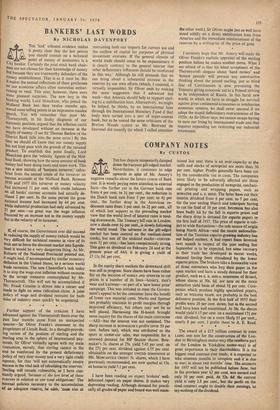COMPANY NOTES
By CUSTOS
THE bus dispute temporarily damped down e
u°
yantgiltiedged market. edge upwards in spite of Mr. Amory's negative remarks about the future course of Bank rate. it is wisely paying more attention to external facts—the further cut in the German bank rate from 4 per cent, to 33 per cent., the reduction in the Dutch bank rate from 5 per cent, to 43 per cent., the further drop in the American re- discount rates from 3 per cent. to 23 per cent., all of which lent support to the prevailing market view that the world level of interest rates is tend- ing downwards. The Treasury bill rate in London, now a shade over 63 per cent., is slowly following the world trend. The advance in the gilt-edged market has been centred on the medium-dated stocks, but one of the undated stocks—CONVER- SION 33 per cent.—has been conspicuously strong. This goes ex dividend on February 24 and at the present price of 64i it is giving a yield of L5 I ls. Od. per cent.
* *
In the equity share markets the downward drift was still in progress. Store shares have been rather flat on the decision of MARKS AND SPENCER to cut prices in a number of its lines—hosiery, men's wear and knitwear—as part of a `new lower price' campaign. This was initiated to meet the Govern- ment's appeal to let the consumer have the benefit of lower raw material costs. Marks and Spencer can probably maintain its profit margins through improved efficiency, but others may not be so well placed. Harnessing the H-bomb brought some inquiry for the shares of the main contractor —AEI--but the interest was not sustained. The sharp increase in BOWMAKER'S profits (over 50 per cent. before tax), which was attributed to the spurt in motor-car sales, was responsible for a renewed demand for HP finance shares. Bow- maker's 5s. shares at 25s. yield 5.45 per cent. on the 271 per cent. dividend against 4.55 per cent. obtainable on the stronger UNITED DOMINIONS at 80s. MERCANTILE CREDIT 5s. shares, which I have previously recommended, are now quoted at 13s. ex bonus to yield 5.1 per cent.
* * * I have been reading an expert brokers' well- informed report on paper shares. It makes very depressing reading. Although demand for practi- cally all grades of paper and board was well main-
tained last year there is an over-capacity at the mills and stocks of newsprint are more than 50 per cent. higher. Profits generally have been cut by the considerable rise in costs. The companies most likely to be adversely affected are those engaged in the production of newsprint, mechani- cal printing and wrapping papers, such as BOWATER and A. E. REED. The fatter have cut their interim dividend from 6 per cent. to 5 per cent. for the year ending March and anticipate having to cut the final of 10 per cent. INVERESK has also been badly hit by the fall in esparto prices and the sharp drop in demand for esparto papers in the first half of 1957. The price of esparto is sub- ject to wide fluctuations—the sole source of origin being North Africa—and the recent nationalisa- tion of the Tunisian esparto-growing industry has not helped matters. A bad report from Inveresk next month in respect of the year ending last September is to be expected, but some recovery in their trade has developed in recent weeks, demand having been stimulated by the lower esparto prices. The brokers take a favourable view of those converters who buy their paper in the open market and have a steady demand for their product, such as E. S. AND A. ROBINSON, of Bristol, whose shares at 50s. 6d. are now on the more attractive yield basis of about 53 per cent. Com- panies which produce highly specialised papers, such as WIGGINS TEAPE, are probably in the best defensive position. In the first half of 1957 their profits were 20 per cent. down, but in the second half have been well maintained. At 38s. the shares would yield 9.15 per cent. on a maintained 173 per cent. dividend, but on a more likely 15 per cent., nearly 8 per cent. I prefer them to A. E. Reed.
* *
The award of a £15 million contract to JOHN LAING AND SON for the construction of the Lon- don to Birmingham motor-way (the southern part of the London to Yorkshire motor-way) is of great importance to their shareholders. It is the biggest road contract ever made; it is expected to take nineteen ,months to complete and it is due to start in about two months' time. The accounts for 1957 will not be published before June, but in the previous year 62 per cent was earned and only 10 per cent. paid. At 52a. lidt the current yield is only 3.8 per cent., but the gsofit on the road contract ought to double their earnings, to say nothing of the dividend.






































 Previous page
Previous page